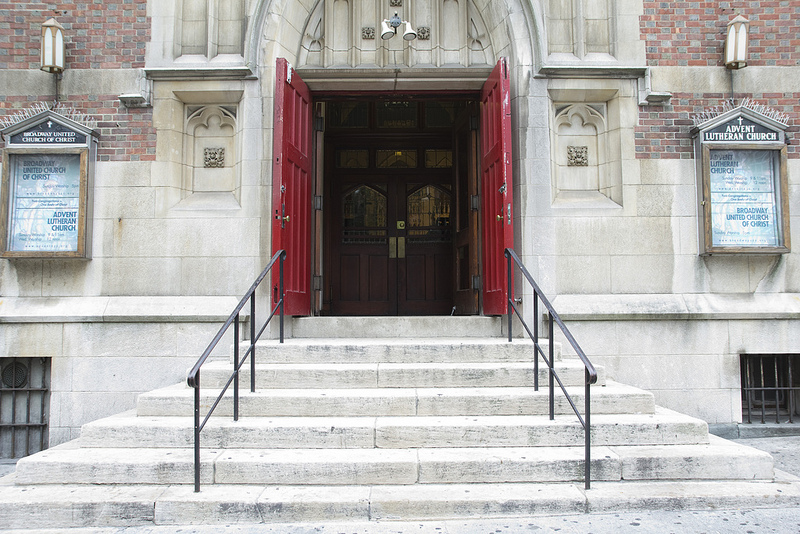Delievered at Advent Lutheran Church, 9 am & 11 am service.
***********
Peace be with you ‚Äì that’s how Jesus enters a room. You would think that a guy who was just killed and raised from the dead might make a bigger kind of entrance ‚Äì have some kind of snappy one-liner or maybe a pun when he walked through the locked door. But, no, Jesus simply goes “Peace be with you” ‚Äì a traditional greeting ‚Äì the kind of greeting he might usually give if it was like any other day. It’s his version of “hey, how’s it going?” – a greeting that you wouldn’t think twice about, but, well, that day wasn’t any normal day.
If you weren’t here for the Easter Vigil last Saturday night ‚Äì then you missed hearing of Mary Magdalene at the tomb; of her coming and weeping and mistaking Jesus for the gardener. And when Jesus called her name ‚Äì called her Mary! – she ran back to the disciples and told them what she had seen; that Jesus was raised; that he was not dead; and that he was on his way to ascend to God. Mary left the garden and ran ‚Äì she ran to the disciples and told them what she had seen ‚Äì that’s the day where our story begins ‚Äì and, once that day is over, we find the disciples gathered together in a room ‚Äì with the front door locked.
That’s their response to Mary’s proclamation ‚Äì to lock the front door.
Our text says that they were afraid ‚Äì afraid of the authorities that killed Jesus; afraid of persecution; just afraid. They locked the front door for protection. Mary’s word of Jesus’s rising ‚Äì didn’t change that. They couldn’t help but focus on their own fears and ideas of their end. And they locked the front door so no one could get in. I imagine it made the disciples feel a little safer; they shut the door on the world, locked it, and that offered a little protection, for the moment, but it didn’t offer peace. In the midst of Easter ‚Äì the disciples went ahead and did the only thing they could think of ‚Äì they locked the front door. So Jesus stepped through it; “Peace,” Jesus said, “peace be with you.”
Now, Thomas gets a bad rap in this story because he’s the one who speaks the words, I think, that all the other disciples were thinking. We’re not told that, once Mary tells the disciples about Jesus, that anyone actually believes her. The Gospel according to Luke fleshes this out a bit, claiming that some of the disciples thought of it as an “idle tale” – an unbelievable, completely untrue, wildly strange, story. And Thomas ‚Äì the one who wasn’t there when Jesus first walked into the locked room – Thomas does what the disciples first did before Jesus greeted them. Thomas doesn’t believe. He doesn’t take their word. He doubles down and says – unless I see him, touch him, see the unhealed wounds that killed him ‚Äì I won’t believe.
But ‚Äì surprisingly – that doesn’t stop Thomas from being in that room the next week. And, while there, Jesus shows up again ‚Äì and Jesus invites Thomas to touch his wounds, to see how he died, to see that what killed him is still unhealed but doesn’t have the last word. Thomas doesn’t touch. I mean, we imagine he does. But the text doesn’t say that. Instead, Thomas rejoices; he proclaims; he actually says something no one else in the entire New Testament says; he looks at Jesus and says “My Lord and my God!”
Thomas gets it! He believes! Thomas doubts no more! He believes so much now ‚Äì that, in the very next chapter, in the story that continues after what sounds like a good place for the gospel to end in today’s reading ‚Äì when Jesus meets the disciples on the seashore after they went out for a late night fishing trip ‚Äì the moment of seeing Jesus in the locked room so moved Thomas ‚Äì that when Jesus stood on the shore ‚Äì Thomas fails to recognize him. Even after seeing the Risen Jesus ‚Äì Thomas still misses Jesus when Jesus calls him from the shore. Even after such a life changing experience ‚Äì Thomas, and all the other disciples, still fail to recognize Jesus when Jesus is right in front of them. It’s like they’re still not fully there ‚Äì not fully filled with belief and faith ‚Äì that they’re still not complete yet. They are caught in the process of never quite getting to that definition of belief that believes faith is an unwavering, solid, completely unquestioning kind of faith. The disciples always fall short of this ‚Äì even if, sometimes, they do get it right every once in awhile.
In a moment, we’re going to call up those who are celebrating First Communion up to the front; we’re going to invite their families to come up with them; and we’re going to all lay our hands on these children of varying age, backgrounds, and experiences ‚Äì and we’re going to affirm the life of faith that they are experiencing and are a part of. *That laying on of hands ‚Äì it’s a physical sign of what these kids have been brought into through their baptism ‚Äì a life of faith; a life of the process of faith; and we’re going to affirm the journey that they, and their parents, are undertaking together.
Because in the feast that they are going to partake in ‚Äì the food and drink that is the Lord’s Supper ‚Äì the Supper that they have been called by Jesus to participate in ‚Äì the feast has a place set for them but it is not an easy feast. They are invited to continue the process that is the journey of faith; the process of being made into disciples ‚Äì of being Mary, and Thomas, and Peter, and the countless unnamed disciples that fill our Scriptures. They’re being affirmed in that process of never truly being finished in this life ‚Äì of having situations come up where they won’t recognize the right way out ‚Äì or the Christian thing to do ‚Äì or they might feel like all of this is a bit of baloney ‚Äì or the questions end up being louder than the answers – or they won’t even realize when Jesus is speaking to them, right then and there. They’re being invited in not knowing the complete story ‚Äì or having all the answers ‚Äì instead they’re being invited to do what the Thomas and the other disciples struggled with ‚Äì what it means to be faithful and trust in the end that God has made for each of us.
When I sat down with the kids, in that little Sunday School room downstairs, were we all sat on those small wooden chairs ‚Äì chairs that I prefer to think of as “fun-sized” rather than “child-sized” – I asked them what the most important thing about God is. What is the most important characteristic of God. And the answer for them was love. But not just that God is love ‚Äì but that God loves us; each of us; even in our incompleteness. God still cares about our lives, about who we are, and about what we’ve done and what we are going to do. And that God is here to walk with us, and be with us, in our incompleteness and imperfection. Because that’s the amazing thing about Thomas’ story ‚Äì that Jesus came to him not once, but twice. That Jesus didn’t leave him hanging when Thomas said he didn’t believe. And that the disciples ‚Äì the entire group of disciples ‚Äì they had room for the doubting Thomas when they gathered together the week after Mary saw Jesus in the garden. That’s what these kids are being affirmed into ‚Äì that we, together, as part of the body of Christ are big enough to walk with them in their journey; that we recognize that they are not unlike us ‚Äì that they are still incomplete like us ‚Äì that their journey begins anew every morning – because that’s what the life of faith is; it’s a process that, in this life, is never finished.
So, when we break off that little bit of bread; and serve that little bit of drink; we’re serving a little bit of the end that is promised to each of us; that this is Jesus’ body and that this is Jesus’ blood, given, and shed, for each of us ‚Äì that, in that moment, when the bread touches our hands, and the drink our lips ‚Äì that it’s all about us in that moment. God’s love is rooted in the smallest possible sign ‚Äì that of a little bread and a little drink to wet our lips. In the smallest of food bits, the unbelievable, widely strange, reality of the resurrection ‚Äì of God’s promise that Jesus’s end is our end; that death is not the final answer; that our expectation of how everything turns out is not what God has in mind ‚Äì in that smallest piece of food, the entirety of God’s promise is made alive to each and every one of us. That is the promise that sustains the life of faith ‚Äì and why we offer it each and every week, every time we meet, that the bread will be broken, the wine shared, the portions handed out, because the life of faith is a process ‚Äì a process that Jesus’ promises not to ignore or allow us to mind on our own. The disciples of Jesus’ day were never finished in their faith. They were never so brilliant or blessed or perfect that they never doubted or failed to recognize the signs of Jesus all around them. No, they were sustained in their journey of faith ‚Äì allowed to live a life that is never fully complete, that never knows all the answers, that never truly receives all the peace that comes from Jesus’s lips when he first walked through that locked front door saying “Peace be with you.” That word of peace comes from a resurrected person ‚Äì not a whole one, not one who is completely healed, but one who carries the bumps, and bruises, pain, joy, love, and grace, that comes from a life of faith ‚Äì a life of faith that we affirm not only on First Communion days ‚Äì but on all days ‚Äì on all our incomplete days of faith ‚Äì forever and ever.
Amen.


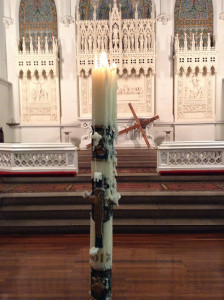 So here’s some Good Friday learning for ya.
So here’s some Good Friday learning for ya. 
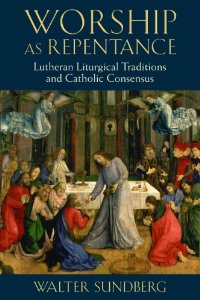



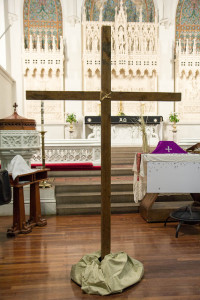 On Friday evening, I led my first funeral. I planned, organized, met with the family, and preached the entire thing. It was a funeral for a woman who was 73 years old. She died while at home, surrounded by her family, and sitting in her favorite chair. She was a member of the church but had not appeared at worship for a little bit. She didn’t grow up Lutheran but she ended up at our church because she liked it. After planning the service with her daughter, we ended up with a Lutheran liturgy with Baptist trimmings. It opened with a Spirit Dance, included liturgical responses that the gathered community didn’t do, and hymns that only I and the musician sung. It included an open coffin through the entire service with a final viewing during the closing hymn. We never got to the dismissal and the body left the church with “I Will Always Love You” by Whitney Houston playing through the sound system.
On Friday evening, I led my first funeral. I planned, organized, met with the family, and preached the entire thing. It was a funeral for a woman who was 73 years old. She died while at home, surrounded by her family, and sitting in her favorite chair. She was a member of the church but had not appeared at worship for a little bit. She didn’t grow up Lutheran but she ended up at our church because she liked it. After planning the service with her daughter, we ended up with a Lutheran liturgy with Baptist trimmings. It opened with a Spirit Dance, included liturgical responses that the gathered community didn’t do, and hymns that only I and the musician sung. It included an open coffin through the entire service with a final viewing during the closing hymn. We never got to the dismissal and the body left the church with “I Will Always Love You” by Whitney Houston playing through the sound system. 
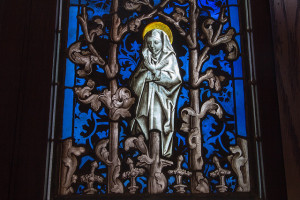 Two weeks ago ‚Äì Pastor Brown brought some of the scripture stories that our Lenten bible studies are looking at. We’re participating in a pilot program of the wider church to help congregations be intentional about finding their story and their story in scripture. Last time, we heard a part of Jonah’s experience ‚Äì his song in the belly of the whale ‚Äì and we heard about Peter’s experience with the picnic blanket that came down from the sky. We heard stories of grace ‚Äì stories of God breaking through the barriers we set up ‚Äì and God not letting our ideas of partiality interfere with the abundance and reality of God’s grace.
Two weeks ago ‚Äì Pastor Brown brought some of the scripture stories that our Lenten bible studies are looking at. We’re participating in a pilot program of the wider church to help congregations be intentional about finding their story and their story in scripture. Last time, we heard a part of Jonah’s experience ‚Äì his song in the belly of the whale ‚Äì and we heard about Peter’s experience with the picnic blanket that came down from the sky. We heard stories of grace ‚Äì stories of God breaking through the barriers we set up ‚Äì and God not letting our ideas of partiality interfere with the abundance and reality of God’s grace. 